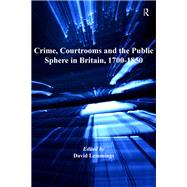Crime, Courtrooms and the Public Sphere in Britain, 1700-1850
, by Lemmings, David, Professor- ISBN: 9781409418047 | 1409418049
- Cover: Nonspecific Binding
- Copyright: 5/13/2016
Modern criminal courts are characteristically the domain of lawyers, with trials conducted in an environment of formality and solemnity, where facts are found and legal rules are impartially applied to administer justice. Recent historical scholarship has shown that in England lawyers only began to appear in ordinary criminal trials during the eighteenth century, however, and earlier trials often took place in an atmosphere of noise and disorder, where the behaviour of the crowd - significant body language, meaningful looks, and audible comment - could influence decisively the decisions of jurors and judges. This collection of essays considers this transition from early scenes of popular participation to the much more orderly and professional legal proceedings typical of the nineteenth century, and links this with another important shift, the mushroom growth of popular news and comment about trials and punishments which occurred from the later seventeenth century. It hypothesizes that the popular participation which had been a feature of courtroom proceedings before the mid-eighteenth century was not stifled by 'lawyerization', but rather partly relocated to the 'public sphere' of the press, partly because of some changes connected with the work of the lawyers. Ranging from the early 1700s to the mid-nineteenth century, and taking account of criminal justice proceedings in Scotland, as well as England, the essays consider whether pamphlets, newspapers, ballads and crime fiction provided material for critical perceptions of criminal justice proceedings, or alternatively helped to convey the official 'majesty' intended to legitimize the law. In so doing the volume opens up fascinating vistas upon the cultural history of Britain's legal system over the 'long eighteenth century'.






